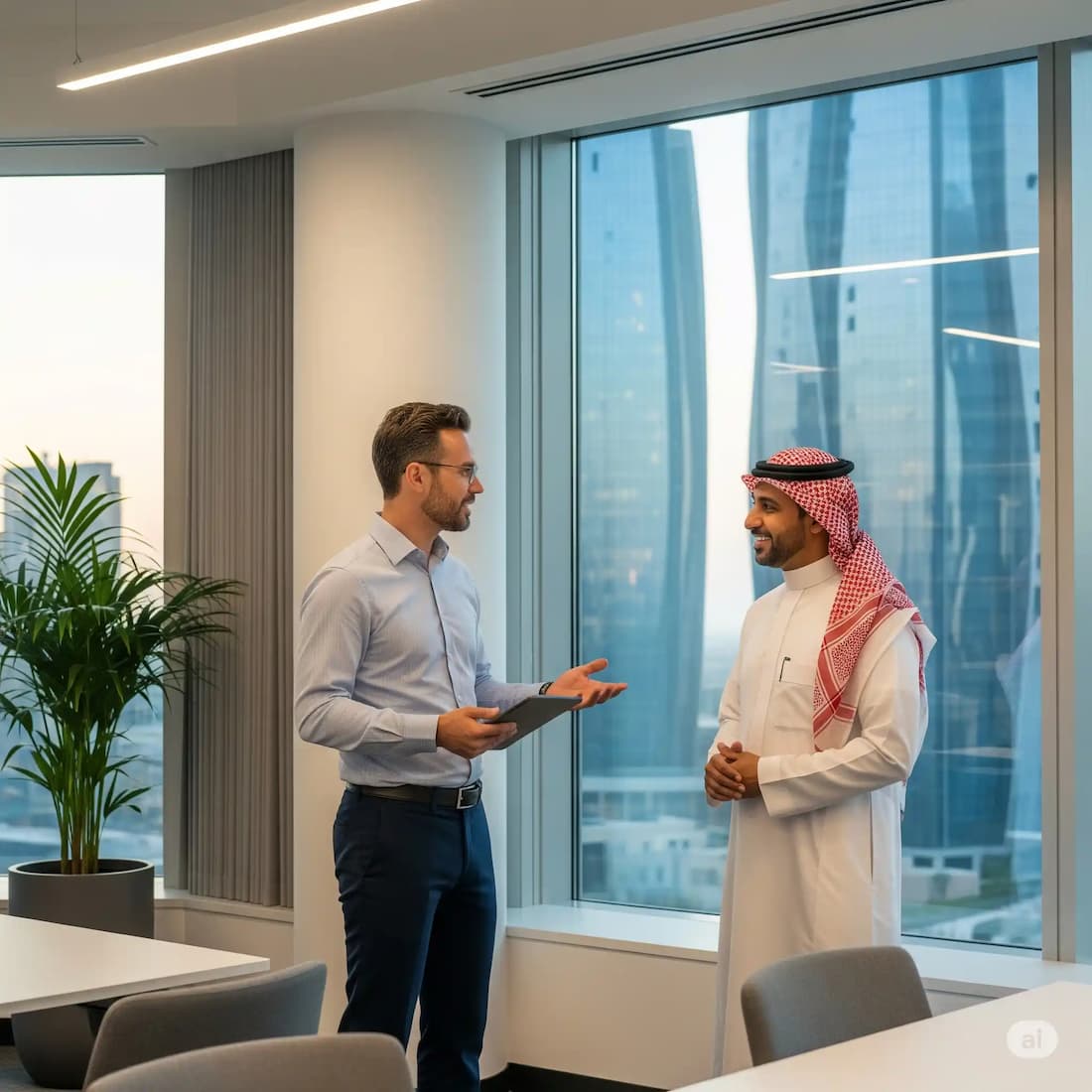Saudi Arabia’s evolving economic landscape has opened the door for foreign investors to establish ventures across a growing range of sectors. The Kingdom encourages entrepreneurship, allowing expatriates to own and operate businesses.

Legal Reforms & Foreign Investor Licensing in Saudi Arabia
Saudi Arabia is actively shaping itself into one of the most welcoming environments for global investment.
Thanks to a series of strategic legal reforms under Vision 2030, the nation now provides an encouraging legal infrastructure for expatriate entrepreneurs and international companies.
Central to this transformation is the ability for foreign investors to gain full ownership of their ventures in approved sectors and access a streamlined licensing process through the Ministry of Investment.
Vision 2030 and Eased Foreign Ownership Laws
Saudi Arabia’s Vision 2030 aims to diversify the economy away from oil dependency. One of its most impactful developments has been the removal of mandatory local partner requirements for many industries.
Today, foreign investors can fully own their businesses in sectors such as consultancy, technology, education, logistics, and light manufacturing.
However, limitations still exist for sensitive sectors like military services, media, and specific types of real estate in Mecca and Medina.
From SAGIA to the Ministry of Investment
The authority previously known as SAGIA has been restructured under the Ministry of Investment.
The process for registering foreign entities is now consolidated into a single certificate known as the Investment Registration Certificate.
This innovation has significantly reduced the paperwork and time required to begin operating legally in Saudi Arabia. It also brings together multiple approvals under one roof, making it easier to manage and renew permits annually.
Types of Investment Licenses
The Ministry of Investment categorizes licenses according to business activity. The main types include:
- Service License: Common for consulting, IT, design, and healthcare services.
- Industrial License: Required for manufacturing, processing, or assembly operations.
- Commercial License: Issued to companies involved in trading, importing, or retail often requiring higher capital and multi-country presence.
- Professional or Scientific License: Typically granted to firms offering specialized consultancy or scientific services, often with strict eligibility.
Each type of license has unique conditions, and applicants must choose based on their business model and long-term strategy.
Ready to launch your venture in Saudi Arabia? Let Motaded guide you through the legal steps, licensing, and ownership setup so you can focus on growing your business with confidence.
Capital Requirements and Investor Eligibility
The capital needed varies significantly depending on license type. A consultancy firm may need minimal capital, especially if operating without physical inventory.
In contrast, a commercial entity may require SAR 30 million or more in capital, a footprint in multiple countries, and a robust operating history.
Industrial ventures often must commit to local employment targets and demonstrate environmental or technical compliance.
Mandatory Documents for Application
To apply for an investor license, companies must submit a full set of documents, including:
- Articles of incorporation, certified and translated.
- Financial statements for the past two years.
- A board resolution approving the Saudi expansion.
- Passport copies of shareholders.
- A comprehensive business plan and market strategy.
- Physical lease agreement or proof of local presence.
All documents must be legally authenticated and translated into Arabic before submission.
Submission and Processing Timeline
Applications are submitted through the Ministry of Investment's digital platform. When all paperwork is complete, service-based applications are usually approved in 5 to 10 working days.
Industrial or commercial ventures requiring multiple approvals may take several weeks. Regular communication with authorities and a local contact person can help speed up the process.
Post-License Registrations and Compliance
Once the investment license is approved, companies must complete a series of registrations:
- Reserve a trade name.
- Register with the Ministry of Commerce.
- Open a commercial bank account.
- Obtain Chamber of Commerce membership.
- Register with the Zakat, Tax and Customs Authority for VAT and other obligations.
- Apply for labor office credentials and Saudization compliance tracking.
These steps are essential to legally activate the business and begin operations.
Benefits of the Investment License
Holding an investment license offers many advantages:
- Full legal ownership in eligible industries.
- Ability to sponsor foreign employees and lease commercial property.
- Eligibility for government contracts and tenders.
- Increased credibility with suppliers, partners, and banks.
- Access to local and international funding channels.
- Simplified renewals and government interaction through centralized systems.
This certificate also allows foreign investors to repatriate profits and reinvest freely within the Kingdom.
Sectoral Restrictions to Keep in Mind
Although most sectors are open, the government has defined a list of prohibited or restricted industries.
These include private security, publishing, oil field services, and real estate development in certain holy cities.
Foreign firms may still participate in some restricted sectors by investing through Saudi partners or acquiring shares in publicly listed companies subject to regulatory limits.
Why This Matters for Entrepreneurs and Companies
Saudi Arabia’s evolving policies toward foreign ownership signal a strong commitment to opening its economy.
With a growing non-oil GDP, rising consumer spending, and a strategic location at the crossroads of Asia, Europe, and Africa, the Kingdom is a prime destination for global investment.
The streamlined licensing system, along with legal clarity and tax transparency, positions Saudi Arabia as one of the most attractive places in the region for business setup.
Investors looking to expand in the Middle East will find this system efficient, inclusive, and forward-thinking.
Navigating the Saudi investment framework can seem complex at first glance, but the system is becoming increasingly business-friendly.
Foreign investors equipped with the right documents, sectoral knowledge, and professional support can capitalize on an environment that actively welcomes innovation, job creation, and economic diversity.
Read About: Complete Doing Business Guide KSA for Entrepreneurs

Cultural Considerations & Local Network Building in Saudi Arabia
Launching or growing a business in Saudi Arabia demands more than compliance and capital. It requires genuine cultural insight, relationship-building skills, and an understanding of how trust shapes business engagement.
These elements are essential for both foreign investors and local entrepreneurs navigating the Kingdom’s distinctive commercial ecosystem.
The Influence of Wasta in Business Dealings
In Saudi Arabia, wasta refers to the system of influence rooted in personal or familial connections. It’s an informal network that plays a significant role in advancing negotiations, resolving bureaucratic hurdles, and facilitating partnerships.
Trust is Built Over Time
Business discussions in Saudi Arabia typically begin with establishing personal trust. Meetings often open with casual conversation about background, family, or shared acquaintances before any business topic is introduced.
This practice reflects the cultural norm where long-term relationships hold more weight than quick transactions. Building this trust requires consistency, patience, and face-to-face engagement.
Hospitality and Professional Etiquette
Hospitality is a cultural pillar. Offering coffee or tea in meetings is more than tradition; it's a signal of respect and goodwill. Turning down such gestures may be considered rude.
Understanding local etiquette includes being mindful of prayer times, avoiding scheduling during religious holidays, and dressing conservatively.
Men and women also engage differently in professional settings, particularly in conservative environments.
Local Expertise Adds Value
Having someone on your team who speaks Arabic and understands local nuances is highly advantageous.
Whether it's for handling administrative procedures or navigating social customs, a local advisor can decode the unspoken rules and improve outcomes.
They help prevent misunderstandings, facilitate introductions, and ease communication with government offices and local partners.
Informal Settings Can Yield Formal Results
Networking often happens outside boardrooms. The majlis, a traditional sitting area for discussions, is a common venue for influential interactions. It’s where relationships are nurtured over multiple visits.
Being invited to a majlis is a sign of respect and interest. Business agreements may not be formalized here, but the groundwork for them often is.
Take the hassle out of setting up your business in Saudi Arabia. With Motaded’s expert support, expats can navigate the process smoothly and legally start your journey today.
Legal Ambiguity and the Importance of Counsel
Saudi Arabia’s legal system incorporates religious principles, which means laws may be interpreted differently across regions or circumstances.
Written contracts don’t always carry the same weight as they do in Western contexts. Legal advisors who understand local interpretations are crucial for drafting enforceable agreements and minimizing risk in case of disputes.
Common Barriers for Foreigners
Despite regulatory advancements, foreign entrepreneurs may still face difficulties, including language barriers, documentation mismatches, or shifting compliance standards.
For instance, obtaining signatures, notarizations, or ministry approvals may require in-person visits or Arabic submissions. These issues are less challenging when supported by local partners who understand the procedural flow.
Cultural Alignment Encourages Partnership
Showing respect for customs is not just polite, it builds credibility. Wearing appropriate attire, addressing people with proper titles, recognizing important holidays, and learning simple Arabic greetings all demonstrate sincerity.
When locals feel you understand and respect their values, they are more likely to support your business.
Adaptation Takes Time and Strategy
Although reforms have opened the economy, Saudi Arabia remains rooted in tradition. Hierarchies still matter. Decisions often come from the top, and junior staff may be hesitant to commit without senior approval.
Foreign businesspeople must adapt by respecting these layers and understanding that multiple meetings may be needed before firm commitments are made.
Strategic Best Practices
To navigate cultural and administrative challenges effectively:
- Dedicate time to forming relationships before pitching proposals.
- Use Arabic-speaking liaisons or interpreters when needed.
- Be consistent with who attends meetings to build familiarity.
- Follow up frequently, but respectfully persistence is valued.
- Align with local consultants to stay current on legal and procedural changes.
- Adjust timelines and expectations to fit the slower pace of decision-making.
Understanding Saudi Arabia’s business culture is essential for sustainable growth. Trust, wasta, local etiquette, and patient relationship-building are key.
These intangible factors often carry more weight than paperwork or strategy alone. For any investor aiming to establish real presence and long-term success, cultural alignment isn’t optional, it's the foundation.
Building a business in Saudi Arabia as a foreign investor requires more than legal compliance; it demands a sincere understanding of the culture and a strategic approach to integration.
While the Kingdom welcomes international entrepreneurs through policies like 100% foreign ownership and streamlined licensing via MISA, success hinges on more than documents and capital.
Navigating local networks, honoring traditions, and maintaining professional etiquette not only strengthen partnerships but also open doors that formal channels may not.
Business moves at the speed of relationships in Saudi Arabia, and those who embrace this reality often experience fewer obstacles and greater opportunities.
As regulations continue to evolve and Vision 2030 reshapes the economy, entrepreneurs who commit to learning and adapting are best positioned for long-term growth.
Whether you're launching a new venture or expanding an existing one, aligning with the local way of doing business is not just beneficial, it's essential. Contact With Us.

FAQs about can expats start business in saudi arabia
Can expats fully own a business in Saudi Arabia?
Yes, thanks to reforms under Vision 2030, most eligible sectors now allow 100% foreign ownership. A license from the Ministry of Investment (MISA) is required.
However, certain fields like oil exploration, private security, or real estate in Mecca and Medina still involve restrictions or require a local partner.
Do foreigners need a local sponsor to open a company?
Not necessarily. In approved sectors, expatriates can obtain a MISA investment license and operate independently. Still, some industries or high-capital businesses may require a Saudi partner or special approval.
Do expat-run businesses need to comply with Saudization?
Absolutely. All companies must follow the Nitaqat program, which mandates specific percentages of Saudi nationals in the workforce, based on company size and industry. Non-compliance can impact visa issuance or government service access.
How can I get expert support for setting up a business in Saudi Arabia?
If you're seeking professional guidance on licensing, Saudization compliance, or foreign ownership setup, Motaded offers full-service support tailored to foreign entrepreneurs.
Their team handles everything from MISA licensing to corporate tax alignment so you can launch and scale with clarity and confidence.
